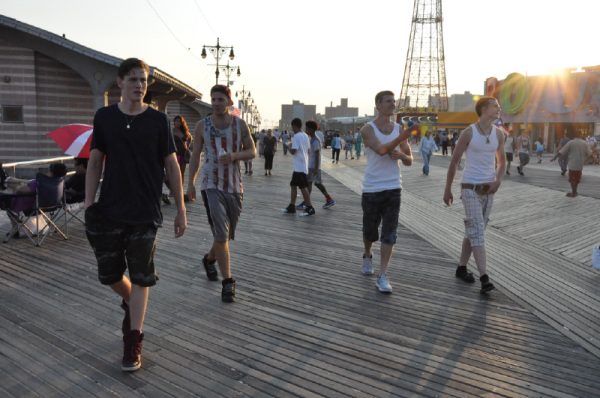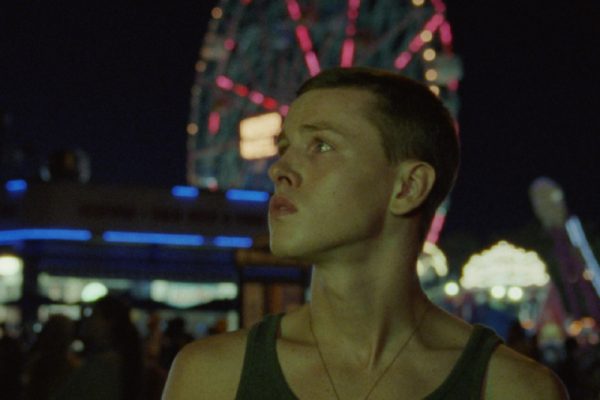BEACH RATS – The Origin
Writer / Director Eliza Hittman talks about the original ideas behind her award winning film BEACH RATS.

BEACH RATS
When Eliza Hittman’s debut feature, IT FELT LIKE LOVE, premiered at the 2013 Sundance Film Festival, it was hailed as a refreshingly unsentimental, original and visually poetic portrait of a teenage girl’s sexual coming-of-age. Hittman was lauded as a filmmaker to watch, and the accolades continued as IT FELT LIKE LOVE played additional festivals and went into theatrical release in 2014. Richard Brody of The New Yorker named it one of the 20 best films of 2014 and wrote “Even as the movie delves deep into the characters’ complex emotional lives, it subtly and gradually—yet ineluctably—conjures a world that I was sorry to leave. I didn’t want the movie to end.”
Hittman knew she would be expected to tell another female-centered story with her second feature, but she wanted to challenge industry assumptions and herself as a filmmaker. She wanted to continue to plumb the outer and inner lives of young people, but chose a different focus. “I grew up in a family where all conversations around sexuality were taboo. I watched someone be brutalized because of their sexuality, but I’ve been barred from writing about my family specifically. My firsthand experiences with homophobia haunt my youth and inspired me to tell a story about a character wrestling with sexuality. I wanted to take on something that was very masculine, and explore the intense pressures on young men to live traditionally masculine lives in an environment with no clear alternative, role model or way out.” BEACH RATS began production on July 25, 2016, and shot for 25 days in different parts of Brooklyn, Queens and Staten Island.
In considering a setting for the story, she was drawn back to the South Brooklyn working-class neighborhoods of IT FELT LIKE LOVE. A native of Flatbush, Brooklyn, Hittman came to know the borough’s coastal communities through high school friends who lived in places like Manhattan Beach. “I’ve always been a little bit fascinated with those neighborhoods and I’d spend a lot of the summer just flopping around those beaches,” she says. “It’s a part of Brooklyn that feels caught between past and present. Those areas have a history of violence of all kinds–crimes against people of color and gay men, and organized crime–and, unlike other parts of the City, change has come very slowly.

Harris Dickinson plays Frankie in BEACH RATS
Her image of the main character in BEACH RATS came from a Facebook image she’d found while researching wardrobe and set design for IT FELT LIKE LOVE. “It was a guy standing at a mirror holding his phone, with a big flash from the camera,” she says. “He had his shirt off and this hat on, and the visor was sort of masking his eyes. It looked like he was about to pull down his gym shorts and take a picture of his dick. There was this tension between hyper-masculine and homoerotic that the picture so clearly illustrated.”
At the same time, Hittman also became interested in Internet-related violence in the LGBTQ community, violence that has had a significant presence in these outer reaches of the City as a microcosm of events that happen throughout the world. The horrifying nature and similarities within stories where dating sites are used to lure people into sexual encounters that end with robbery, beatings, and even death. Hittman says “it’s a very dark subject, one that I know will have a divergent response as it’s a difficult topic that continually recurs.”
From there, Hittman started building out the world of Frankie, a 19-year-old facing an aimless summer at an uncertain moment in his life. His father is in the last stages of cancer, dying in hospice care in the family living room. Frankie spends his days killing time, getting high and hanging out with three delinquent fellow beach rats. At home, he squirrels himself away in the basement, where he can flirt with older men online without anyone knowing. But when a self-assured, sexy local girl named Simone makes a play for him on a Friday night at Luna Park, he awkwardly goes along with it.

Eliza Hittman writer / director of BEACH RATS
Related Articles
- Pride and Protest
- 1985 – What a Year ?
- Campbell X and THE WATERMELON WOMAN
- Scorsese, Pio and making THE CIAMBRA
- REINVENTING MARVIN – The Origins
- Being DISCREET with director Travis Mathews
- MARIO a revealing look at homosexuality in The Beautiful Game.
- Meet the Amatos – with THE CIAMBRA Director Jonas Carpignano
- Tamara Shogaolu talks about HALF A LIFE from Boys on Film 18: Heroes
- All about “Buddy”, in Boys on Film 18: Heroes.
